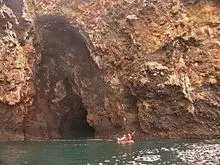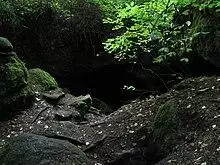cave
A cave or cavern is a natural void in the ground, specifically a space large enough for a human to enter. Caves often form by the weathering of rock and often extend deep underground. The word cave can also refer to much smaller openings such as sea caves, rock shelters, and grottos [洞穴], though strictly speaking a cave is exogene, meaning it is deeper than its opening is wide, and a rock shelter is endogene.
Speleology is the science of exploration and study of all aspect of caves and the cave environment. Visiting or exploring caves for recreation may be called caving, potholing, or spelunking.
It is estimated that a cave cannot be more than 3,000 metres (9,800 ft) vertically beneath the surface due to the pressure of overlying rocks. This does not, however, impose a maximum depth for a cave which is measured from its highest entrance to its lowest point, as the amount of rock above the lowest point is dependent on the topography of the landscape above it.
Solutional caves or karst caves are the most frequently occurring caves. Such caves form in rock that is soluble; most occur in limestone, but they can also form in other rocks including chalk, dolomite, marble, salt, and gypsum [白垩、白云石、大理石、盐和石膏].
Painted Cave, a large sea cave, Santa Cruz Island, California; An entrance of the Torhola Cave in Lohja (Finland)


我理解的“洞”是“山洞”的“洞”,即和地面平行(左图)。英语似乎“洞”和“穴”(右图)不分。再如thick有“粗”、“厚”、“稠”等多种意思。
A cavity is a space or hole in something such as a solid object or a person's body.
A den is the home of certain types of wild animals such as lions or foxes.
A grotto is a small cave with interesting or attractively shaped rocks.
A hollow or dip is a place in something that is at a slightly lower level than its surface.
"Cave houses" have become a top choice for tourists in Yan'an, a former revolutionary base of the Communist Party of China (CPC).
A worker cleans a cave house at Kangping village in Baotao district of Yan'an, Northwest China's Shaanxi province, on May 6, 2019. [Photo/Xinhua]
"In addition to their distinctive appearance, the facilities inside are modern. I can take a hot bath and have access to the internet," said tourist Cheng Shangzhi.
A cave house, or "yaodong," is a form of earth shelter dwelling common on the Loess Plateau in northern China. Taking advantage of thick loess layers and favorable landforms, the sturdy and durable yaodongs are mostly carved into hillsides. They do not take up valuable arable land and are warm in the winter and cool in the summer.
延安市宝塔区冯庄乡康坪村。我不知道“宝塔”该翻译成"Baota"还是"Baotao". “陕西”为了和“山西”区分,翻译成"Shaanxi"是对的。“山”笔画少,嘻嘻。
the internet改成the Internet可能更好。
Loess /'ləues/ Plateau: 黄土高原。我电脑上的几本词典里,只有牛津词典里有loess这个词,它好像不是GRE词汇。说"大多数美国人不认识这个词"太草率了,但Joey肯定不认识。
想起个老笑话:“我家孩子词汇量xxx,够吗?” “在加州够了,在海淀不够。”
Edgar Snow: 原来埃德加斯诺和Jon Snow一个姓啊!
bombproof: 防弹,不是bamboo roof.
吴起镇隶属陕西省延安市吴起县。1935年10月19日,红军陕甘支队到达陕甘革命根据地的保安县吴起镇。
”镇“应译为town. 中国各级行政区划的英文表达 - 爱思英语
rent/lease from/to
Cave houses help revolutionary base transform into tourist hotspot - Chinadaily.com.cn




 浙公网安备 33010602011771号
浙公网安备 33010602011771号